No products in the cart.

No products in the cart.
Blog


Creative Recipes Using Ginger Glow as a Base
In the gentle glow of a sunlit kitchen, where spices dance and aromas weave tales of comfort, Ginger Glow by Earthly Herbs emerges as more than a tea—it’s a canvas for culinary creativity. This caffeine-free blend, with its warming ginger kick and subtle anise undertones, invites you to experiment beyond the mug. Imagine transforming a simple steep into vibrant mocktails, cozy lattes, or even infused treats that delight the senses. Perfect for home entertainers or solo sippers, these recipes highlight Ginger Glow’s zesty, spiced profile, blending ease with flair. Whether you’re hosting a gathering or unwinding solo, let’s stir up some inspiration with fun, accessible ideas that celebrate flavor and imagination—no fancy tools required.
Soothing Spiced Latte: A Creamy Comfort Classic Kick off your creations with a latte that wraps you in warmth like a favorite blanket. Start by steeping one Ginger Glow tea bag in 8 oz of hot water for 5-7 minutes, allowing the ginger’s spicy kick and chamomile’s floral sweetness to fully bloom. Remove the bag and stir in a splash of warm plant-based milk—coconut for a tropical twist or rice for subtle lightness—along with a dash of honey or maple syrup to enhance the licorice-like aroma from anise and fennel. For extra indulgence, froth the milk with a handheld whisk and sprinkle a pinch of ground cinnamon on top. The result? A creamy, spiced sip where peppermint’s cool mintiness balances the ginger’s heat, creating a layered flavor that’s inviting on chilly mornings or as an afternoon pick-me-up.
Prep time: 10 minutes. Serves: 1.
Pro tip: Make it vegan by opting for oat milk, which adds a natural creaminess that complements the blend’s herbaceous depth.
Citrus-Ginger Infusion: A Bright, Aromatic Twist For a refreshing take that brightens any day, try this infusion that amplifies Ginger Glow’s invigorating notes. Brew the tea as usual—one bag in 8 oz hot water for 5-7 minutes—then add fresh orange slices or a cinnamon stick while steeping to infuse a citrusy zing that dances with the lemon balm’s fresh hint. Let it cool slightly if serving hot, or chill for an iced version poured over ice cubes garnished with a sprig of mint. The fennel and anise contribute a mild, licorice-flavored depth that pairs beautifully with the citrus, resulting in a balanced, aromatic drink that’s as visually appealing as it is flavorful. Experiment by swapping orange for grapefruit slices for a tart edge, or add a squeeze of lime for extra vibrancy. This recipe shines at brunches or as a non-alcoholic aperitif, offering a light, spiced profile that’s endlessly adaptable.
Prep time: 8 minutes (plus chilling if iced). Serves: 1-2.
Honey-Lemon Digestif: A Tangy, Calming Variation Elevate after-meal moments with this simple digestif that spotlights Ginger Glow’s soothing spices. Steep the tea strongly—perhaps using two bags in 8 oz hot water for 6 minutes—to draw out the peppermint’s refreshing mintiness and ginger’s warming bite. Stir in a squeeze of fresh lemon for a tangy contrast and sweeten with raw honey, which mellows the anise’s sweetness into a harmonious finish. Serve warm in small cups for a cozy end to dinner, or chill and add sparkling water for a fizzy mocktail twist. The chamomile’s floral, apple-like sweetness ties it all together, creating a flavor profile that’s subtle yet satisfying—ideal for sharing stories around the table. For a seasonal spin, incorporate a dash of turmeric for golden hue and earthy warmth. This one’s a crowd-pleaser, blending ease with elegance.
Prep time: 7 minutes. Serves: 2.
Cool Minty Refresher: An Invigorating Iced Delight When the day calls for something cool and lively, this refresher turns Ginger Glow into a summery star. Double-steep two tea bags in 8 oz hot water for 5 minutes, then cool completely before pouring over ice with cucumber slices or fresh mint leaves for added crispness. The lemon balm’s lemon-scented hint shines here, mingling with peppermint’s cool refreshment to create a light, herbaceous iced tea that’s perfect for outdoor picnics or active afternoons. Enhance with a splash of apple juice for subtle sweetness, or muddle in berries for a fruity burst that complements the fennel’s mild depth. This recipe captures Ginger Glow’s versatile spice in a chilled form, making it a go-to for hydration with flair.
Prep time: 10 minutes (plus cooling).
Serves: 1-2.
Mixing It Up: Tips for Customizing Your Ginger Glow Creations The beauty of Ginger Glow lies in its adaptability—its warming, spiced sips serve as a base for endless personalization. Start with fresh ingredients to let the organic herbs shine, and adjust steeping times for intensity: Shorter for milder flavors, longer for bolder spice. Pair with snacks like ginger cookies to echo the blend’s kick, or use leftovers in smoothies for a flavored boost. For gatherings, scale up recipes and set up a DIY station with add-ins like honey, citrus, and herbs—watch as guests craft their own versions. Remember, experimentation is key; Ginger Glow’s balance of ginger heat and mint cool makes it forgiving and fun.
Ready to brew your own adventures? Shop Ginger Glow today on our site and unlock these recipes in your kitchen. For more creative inspirations, subscribe to our newsletter—your next flavor discovery awaits.
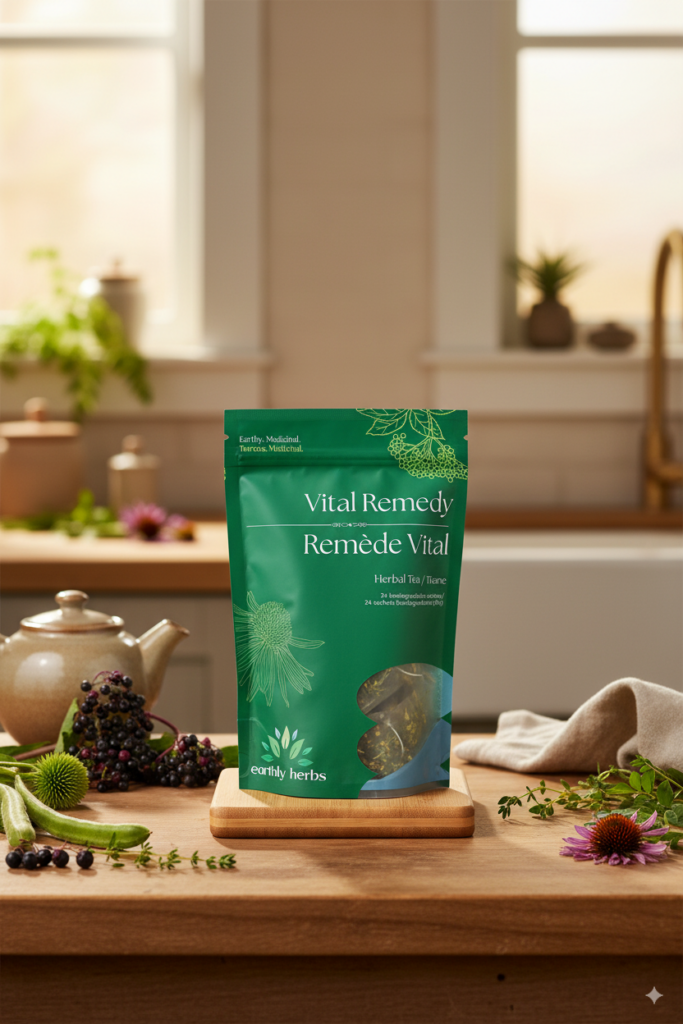
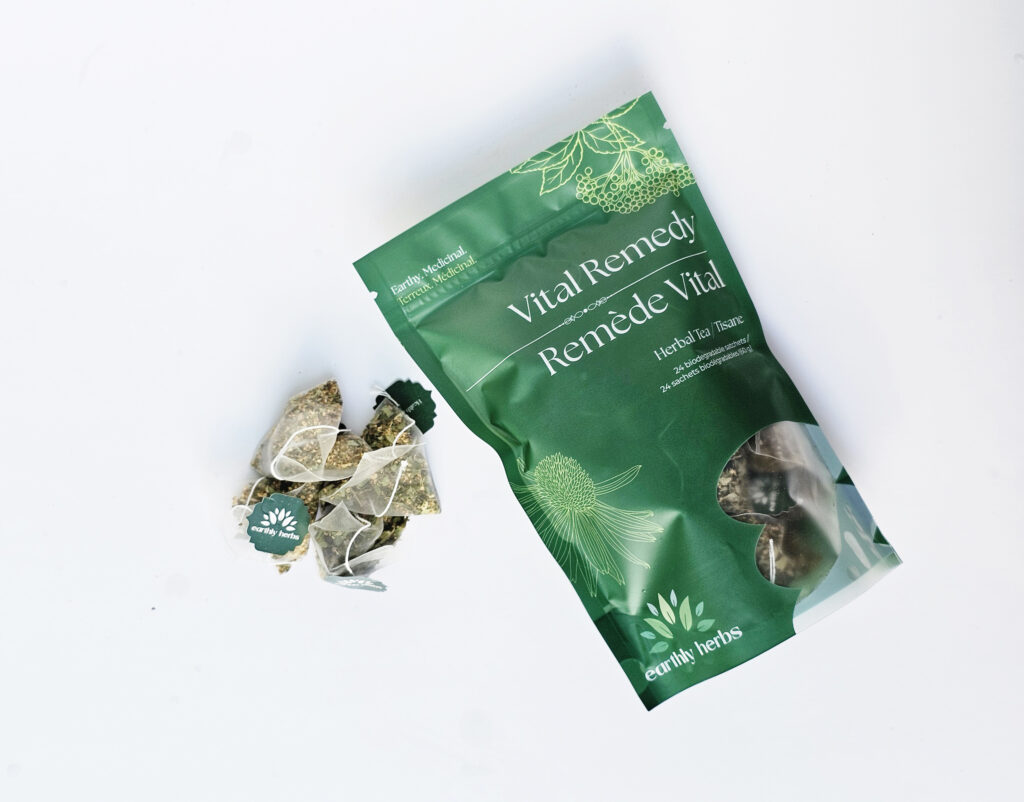
Exploring Herbal Histories: The Legacy of Vital Remedy Ingredients
In the tapestry of time, where ancient wisdom weaves through the threads of modern rituals, herbs have long held a place of reverence in human stories. Vital Remedy by Earthly Herbs draws from this rich heritage, blending premium organic elderberries, echinacea, moringa, and thyme into a robust, herbaceous tea that’s as intriguing in flavor as it is in folklore. This post invites you on a journey through the cultural tales and historical anecdotes surrounding these ingredients—echoes from civilizations past that add depth to every sip. Far from mere components, these herbs carry legacies of tradition, exploration, and artistry, reminding us how nature’s gifts have inspired generations. Whether you’re a history buff or simply curious about your cup, let’s uncover the stories that make Vital Remedy a blend steeped in legacy.
The Folklore of Elderberries: From Mythic Trees to Cultural Staples Elderberries, with their tart, berry-like sweetness in Vital Remedy, trace back to ancient European folklore where the elder tree was revered as a guardian of the home. In Celtic myths, it was believed to house spirits, and branches were hung over doors for protection—a custom that evolved into decorative uses in medieval homes. Native American tribes, such as the Cherokee, incorporated elderberries into dyes and tools, while in Scandinavian tales, the tree symbolized renewal, often featured in spring festivals. By the Middle Ages, elderberries appeared in English recipes for cordials and wines, celebrated for their deep purple hue and robust flavor in communal gatherings. In Vital Remedy, this ingredient adds a vibrant, fruity tang, evoking those age-old traditions of harvest and hearth—perfect for savoring in a warm cup that nods to history’s bountiful tables.
Echinacea’s Native Roots: A Prairie Plant’s Enduring Tale Echinacea, contributing an earthy, herbal depth to the blend, has a storied past rooted in the North American prairies. Indigenous peoples, including the Plains tribes like the Lakota and Cheyenne, wove echinacea into their oral traditions as a versatile plant from the vast grasslands. It was traded along ancient routes, symbolizing resilience in stories passed down through generations. European settlers encountered it in the 18th century, documenting its use in journals as a “prairie flower” that captured the wild spirit of the frontier. By the 19th century, it had crossed oceans, appearing in Victorian herbals as a curiosity from the New World. In Vital Remedy, echinacea’s subtle, grounding taste layers in a sense of timeless adventure, much like the explorers’ tales that carried it far and wide—inviting you to reflect on the plant’s journey from open skies to your teacup.
Moringa’s Ancient Wanderings: From Himalayan Origins to Global Lore Moringa, bringing a fresh, green vibrancy to Vital Remedy, boasts a legacy that spans continents and millennia. Originating in the foothills of the Himalayas, it features in ancient Ayurvedic texts from India around 2000 BCE, where it was poetically dubbed the “drumstick tree” for its pod shapes, symbolizing abundance in harvest myths. African folklore, particularly in Ethiopian and Sudanese traditions, celebrated moringa as a “miracle tree” in oral histories, used in rituals and as a staple in nomadic tales of survival. By the time of the Roman Empire, traders carried it along spice routes, where it appeared in Mediterranean stories as an exotic import. In modern retellings, moringa’s adaptability inspires global narratives of resilience. Within Vital Remedy, its lively, verdant note adds a worldly flair, echoing those epic wanderings—a sip that connects you to the herb’s far-flung heritage across cultures and eras.
Thyme’s Classical Charm: Echoes from Mediterranean Myths Thyme, infusing a savory, aromatic note into the blend, carries whispers from ancient Greece and Rome, where it symbolized courage in epic poems like Homer’s Odyssey. Warriors adorned themselves with thyme sprigs before battles, a custom that evolved into garden lore, with the herb planted in temple grounds for its fragrant allure. In Egyptian embalming rituals, thyme’s preservative qualities featured in pyramid texts, linking it to eternal life motifs. Medieval European monasteries cultivated it for monastic manuscripts, where it represented purity in illuminated herbals. Shakespeare’s plays even nod to thyme as a garden staple, evoking Elizabethan romance. In Vital Remedy, thyme’s warm, peppery essence brings this classical charm to life, layering a timeless sophistication that’s ideal for contemplative brewing—bridging ancient myths to your contemporary cup.
Embracing the Legacy: How Vital Remedy Honors Herbal Histories As we trace these threads, Vital Remedy emerges not just as a tea, but as a vessel for stories—each ingredient a chapter in humanity’s enduring bond with nature. From elderberries’ protective folklore to thyme’s mythic valor, this blend invites you to infuse your routine with a touch of the past. Brew it hot for a grounded ritual or chilled for a refreshing twist, and let the flavors transport you. Curious to taste this historical harmony? Shop Vital Remedy on our site today, and discover how these legacies unfold in every pour. For more blend explorations, subscribe to our newsletter for exclusive insights and recipes.

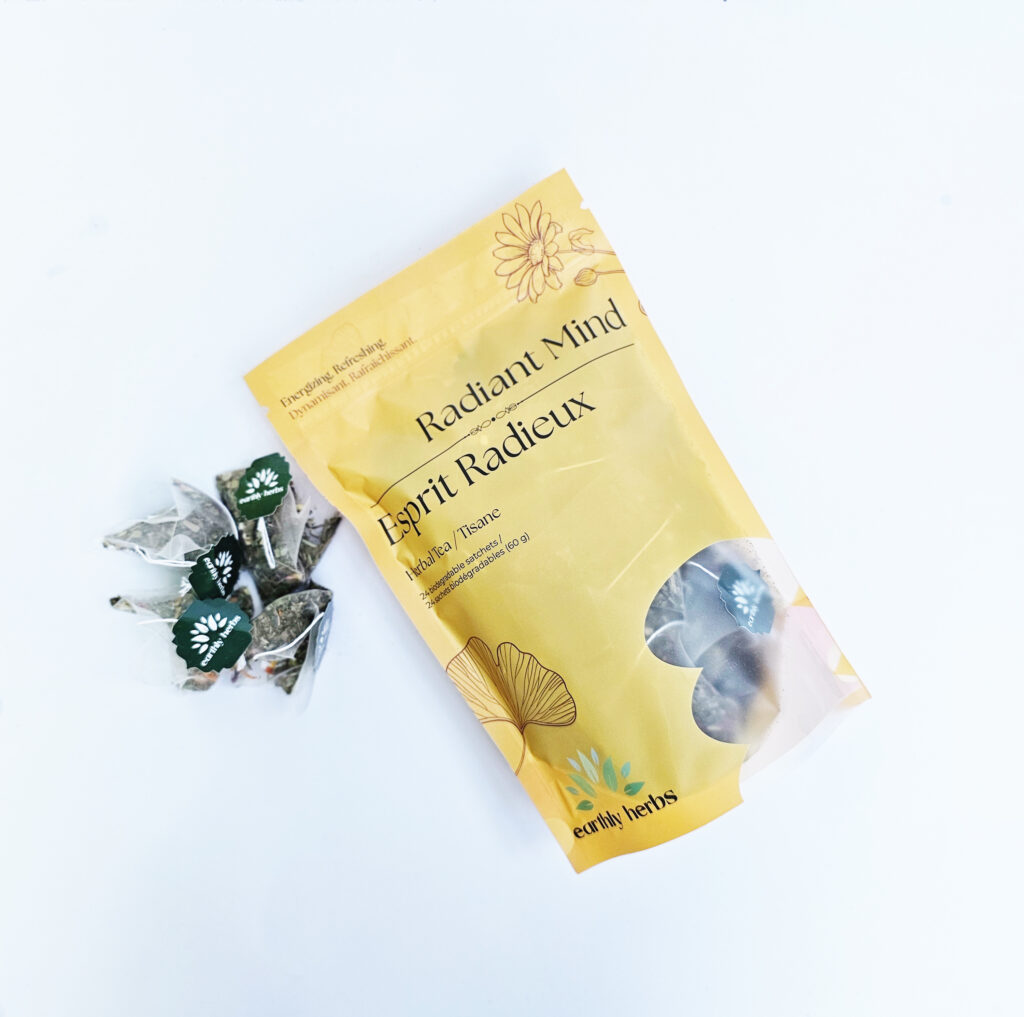
Flavor Profiles: Unpacking the Layers in Radiant Mind Blend
In the quiet dance of dawn’s first light, where thoughts awaken like leaves unfurling, there’s a blend that whispers invitation to the senses. Radiant Mind by Earthly Herbs isn’t just a tea—it’s a symphony of flavors, each herb contributing its unique note to a harmonious cup. As you steep and sip, layers reveal themselves: earthy depths, bright citrus lifts, and subtle floral graces. Join us on this sensory journey through the premium organic ingredients that make Radiant Mind a delight for the palate, perfect for those mindful moments when you crave something invigorating yet balanced. Whether you’re brewing solo or sharing with friends, let’s explore the tastes and aromas that elevate your daily ritual.
The Earthy Foundation: Gotu Kola and Ashwagandha At the heart of Radiant Mind lies an earthy base that grounds the blend in subtle richness. Gotu Kola brings a fresh, mildly bitter green note—think of it as the crisp edge of a garden herb, evoking the verdant whisper of spring leaves. Its profile is light and herbaceous, adding a clean, almost grassy undertone that lingers softly on the tongue. Paired seamlessly is Ashwagandha, a traditional adaptogen with deep, earthy notes reminiscent of fresh soil after rain. This herb imparts a warm, slightly nutty depth, creating a foundational layer that’s comforting and full-bodied without overpowering. Together, they form the blend’s backbone, inviting you to savor the grounded essence of nature in every sip.
Herbal Sharpness: Ginkgo Biloba, Rosemary, and Sage As the brew unfolds, sharper, more aromatic elements emerge to add intrigue and vitality. Ginkgo Biloba contributes an earthy, nutty depth with a subtle hint of sweetness, like the faint echo of roasted nuts in a forest trail mix. Its flavor is understated yet distinctive, blending smoothly to enhance the overall complexity. Rosemary steps in with its piney, aromatic sharpness—evoking the resinous scent of Mediterranean pines, it infuses a woody, invigorating edge that’s both refreshing and bold. Imagine the herbal kick of a sun-warmed garden, where each sip carries a whisper of evergreen. Complementing this is Sage, offering a savory, slightly peppery flavor that adds a warm, earthy spice. Its profile is reminiscent of autumn herbs, with a mild bitterness that rounds out the blend’s mid-notes, creating a layered experience that’s intriguing from first steep to final drop.
Refreshing Accents: Peppermint and Lemon Verbena To brighten the composition, Radiant Mind incorporates cooling and citrusy accents that lift the senses like a gentle breeze. Peppermint provides a cool, refreshing mintiness—its clean, crisp bite cuts through the earthier tones, leaving a tingling freshness that awakens the palate. Picture the invigorating chill of menthol, balanced just right to add lightness without dominance. Lemon Verbena elevates this with a bright, citrusy herbal lift, evoking the zesty aroma of fresh lemons mingled with green herbs. Its flavor is sunny and tangy, infusing a subtle sweetness that dances on the edges, making each cup feel alive and vibrant. These elements create a refreshing contrast, turning the blend into a multifaceted delight ideal for mid-morning pauses or afternoon reflections.
Floral Whispers: Calendula and Cornflower Petals The finale comes in soft, floral whispers that add elegance and a touch of whimsy. Calendula provides a subtle, floral sweetness—its gentle, honey-like notes evoke golden petals in bloom, offering a mild, sunny warmth that softens the blend’s sharper edges. It’s like a quiet meadow stroll, where the flavor blooms delicately on the finish. Cornflower petals infuse a light, mildly sweet floral touch, with hints of clover and a faint nuttiness. Their presence is ethereal, adding visual appeal with blue hues in the dry blend and a whisper of sweetness in the cup. These floral accents tie everything together, leaving a lingering, poetic aftertaste that’s as pleasing to the eye as it is to the taste buds.
Tasting Tips and Creative Infusions for Radiant Mind To fully appreciate Radiant Mind’s layers, start with fresh, filtered water heated to 95°C (just below boiling) and steep for 4-6 minutes—any longer might amplify the bitter notes from Gotu Kola. For a pure tasting, sip it black to let the earthiness shine; add a touch of honey to enhance the floral sweetness if you prefer. Experiment with infusions: Try a Focused Herbal Latte by blending steeped tea with warm almond milk and a pinch of nutmeg for creamy indulgence. Or create a Citrus Clarity Infusion with fresh orange peels— the zesty addition amplifies Lemon Verbena’s brightness. For cooler days, a Honeyed Mind Elixir with raw honey and turmeric offers a golden, subtly spiced twist. And don’t forget iced: Double-steep and chill over ice with lemon slices for a refreshing floral refresher. These ideas turn your cup into a canvas, inviting creativity in every brew.
As you explore Radiant Mind’s flavor profiles, remember it’s more than ingredients—it’s an invitation to pause and savor. Ready to experience this blend for yourself? Shop Radiant Mind today on our site, and let its layers inspire your next ritual. For more sensory adventures, subscribe to our newsletter for exclusive recipes and blend spotlights.
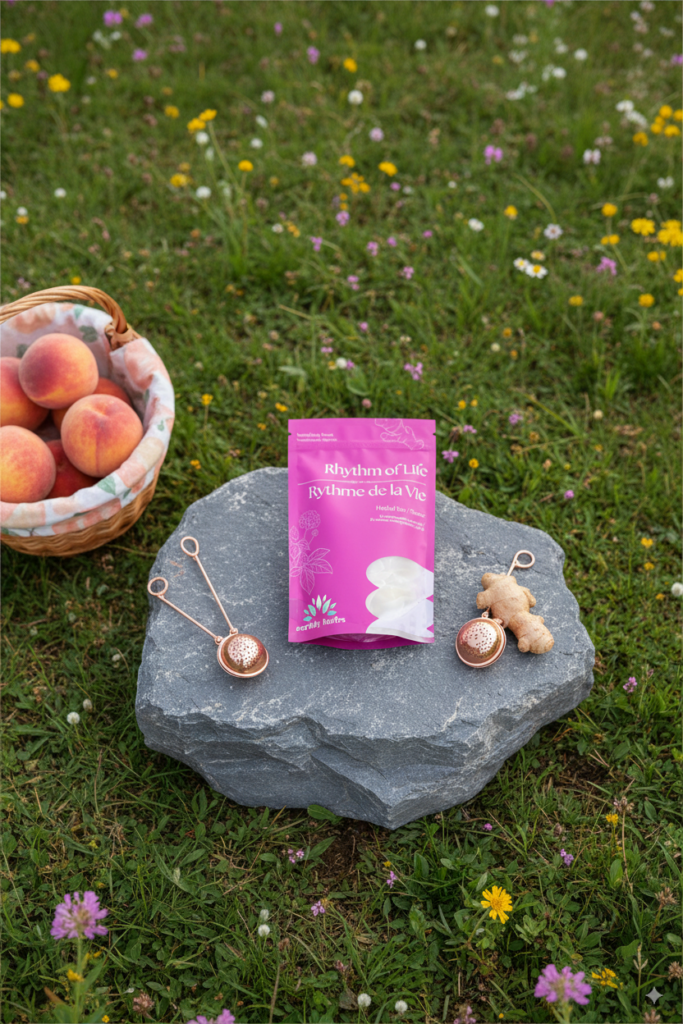


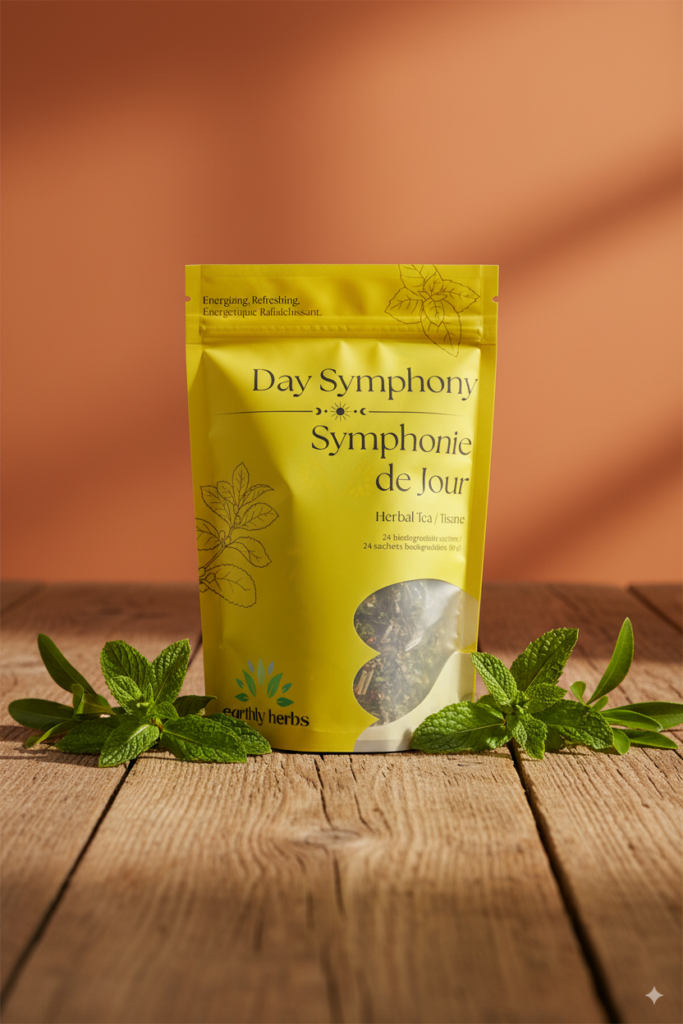

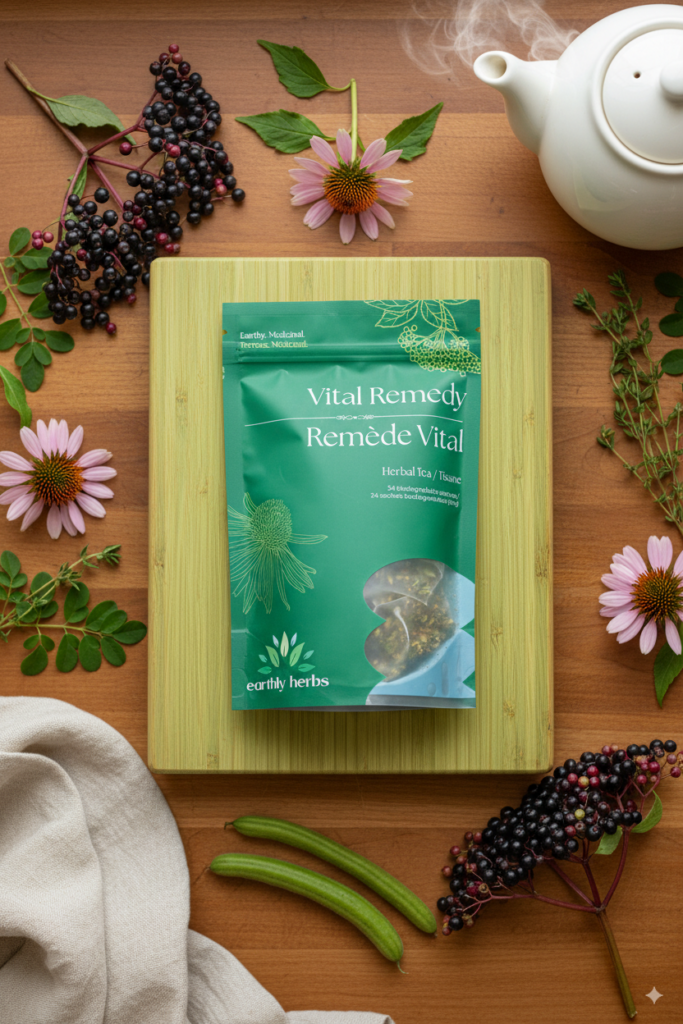

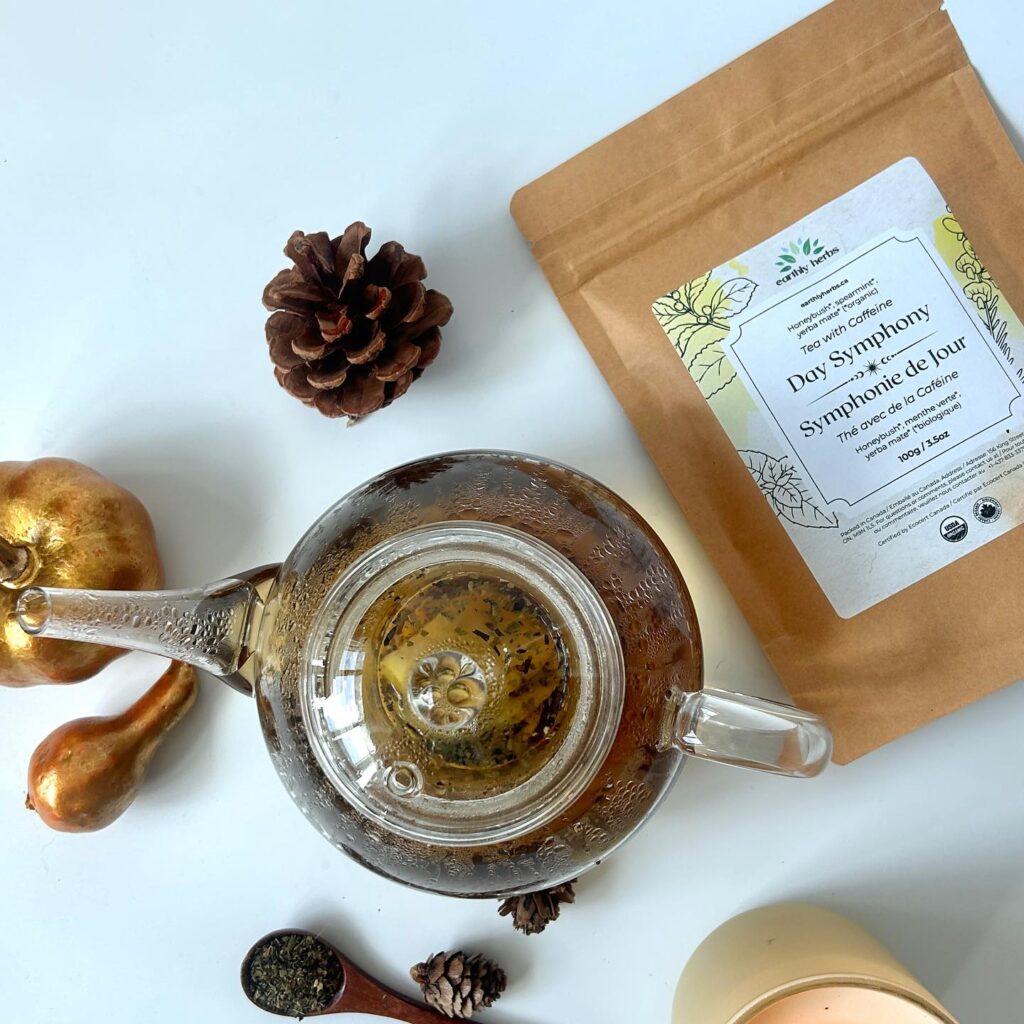
Coffee: The Energy of Stress vs. Day Symphony: The Energy of Serenity
In our modern era, with its immense work pressures, the first thought for many of us after opening our eyes is a dark, burnt, and bitter word that has become synonymous with morning: Coffee.
This beverage has become an inseparable part of the morning routine for millions. But is this potent stimulant truly a good choice for starting a great day? Have you ever read about the downsides of coffee but felt you had no good alternative, forcing you to endure side effects like a racing heart and anxiety just to get through the morning?
Let’s take a closer look at this widely consumed drink.
The True Face of Your Coffee Cup We drink coffee for its energy, but this energy is often a double-edged sword. The caffeine in coffee abruptly stimulates our nervous system, and the results can include:
- Anxiety and Palpitations: That feeling of unease and a racing heart is a chemical reaction. Caffeine increases stress hormones like adrenaline and cortisol, putting the nervous system in a “fight or flight” state.
- The Energy Crash: The energy from coffee is like a flash fire; it ignites quickly and burns out just as fast. This “crash” occurs because once the caffeine wears off, a surge of the sleep-inducing chemical (adenosine) that was previously blocked floods the brain, causing profound fatigue.
- Digestive Issues: Coffee is acidic. Caffeine increases the production of stomach acid while relaxing the valve between the esophagus and the stomach, leading to acid reflux and discomfort.
- Sleep Disruption: Even a morning cup of coffee can disrupt your sleep quality at night. By blocking adenosine receptors (the brain’s sleep signal), caffeine interferes with the body’s natural sleep-wake cycle, preventing you from entering the deep, restorative phases of sleep.
Coffee wakes you up, but does it also give you calm, sustained focus?
Introducing an Intelligent Alternative: The “Day Symphony” Herbal Tea Now, imagine a different scenario. You start your day with a warm, delightful drink that not only awakens you but also nourishes your body and prepares your mind for a successful day. This drink is named “Day Symphony,” an artful blend of three premium organic herbs orchestrated for a unique experience:
- Yerba Mate Green: This herb offers a smooth, green tea-like note with natural caffeine content, providing a gentle lift that many enjoy as a jitter-free option for morning energy.
- Honeybush: The base of our blend, this herb contributes a subtly sweet, earthy flavor and is appreciated for its antioxidant-rich profile, adding a calming touch to your ritual.
- Spearmint: Spearmint infuses a refreshing, minty freshness, often favored for its invigorating aroma that complements a balanced start to the day.

